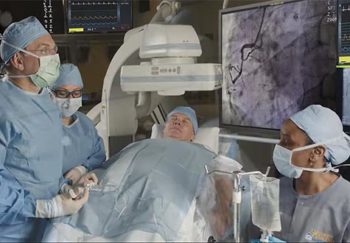
Heartburn is a very common condition that, in some people, can also be a sign of a heart attack. How do you know if it's just heartburn or heart attack?

Your heart has one of the most important jobs in your body – by pumping blood all around you, it gives you the energy you need for your daily life. When problems happen with your heart, you want the best experts and care to get your heart back on your beat.
Heart disease is the leading cause of death for men and women in the U.S. Several medical conditions and lifestyle choices can put you at a higher risk for heart disease, like:
If you or someone in your family has heart problems, you want to find the best heart care around. You only have one heart. You don’t want to trust it to just anyone.
UVA Health’s cardiologists and vascular surgeons have the deep training and experience you want when looking for someone to guide your care. We make sure you get the thorough, expert attention you deserve.
In fact, UVA Health’s heart and vascular care expertise has been honored with a number of awards.
U.S. News & World Report ranked 4 of our heart treatment services as “high-performing,” which means they’re among the best in the U.S.:
And, we’ve gotten recognition from the American Heart Association, the Society of Thoracic Surgeons, and more. See our heart care awards.
Many heart conditions can be avoided with the right combination of diet, exercise, and awareness.
Keeping to a heart-healthy diet (eating lots of fruits, veggies, and whole grains) and limiting junk food and sugary drinks are great first steps to keeping your heart in good shape.
Exercise also does lots of good for your heart. You don’t need an expensive gym membership or fancy equipment at home even just taking a walk or riding your bike can help keep your heart in tip-top shape.
Sometimes, despite your best efforts, your heart might need some extra attention. When heart disease starts to develop, our providers can help with:
The following information can help you with preventing and managing your heart conditions. And, you can read about some of our heart experts and how they’ve helped patients here at UVA Health.

Heartburn is a very common condition that, in some people, can also be a sign of a heart attack. How do you know if it's just heartburn or heart attack?

Protein shakes, powders and snack bars are big business, but how much protein do we really need in our diets?

Jennifer Kirby, MD, talks about the many factors that go into weight loss, setpoints and how to maintain a healthy weight.

After ten years working in finance, Holly Roach felt something was missing. She went back to school to become a nurse, and is now an assistant nurse manager in the UVA electrophysiology lab. Read about what inspired her to make the change, and what a typical day looks like now.

This north African vegetarian dish is healthy and delicious, perfect for autumn. Get the recipe.

If you drink too much water, the concentration of sodium in your blood drops, and, in severe cases, you can die. Don't force water: Drink to your thirst.

Club Red's star-spangled fruit salad is an easy, healthy alternative take on summer fruit. Pretty to look at and a filling side dish perfect for cookouts.

Read how actress Amy Schumer's career was shaped by her father's multiple sclerosis. Plus, how a routine colonoscopy saved one woman's life and more stories from the latest issue of Vim & Vigor.

RN Regina Ragland has worked on UVA's heart and lung unit for almost five years. But beyond her full-time job, she’s also seeking a bachelor’s of science in nursing (BSN) degree.

During a heart attack, blood stops flowing to the heart muscle. Without oxygen, the heart tissue becomes damaged or dies. Learn about how we treat STEMI heart attacks at UVA.
Get stories & health tips every week